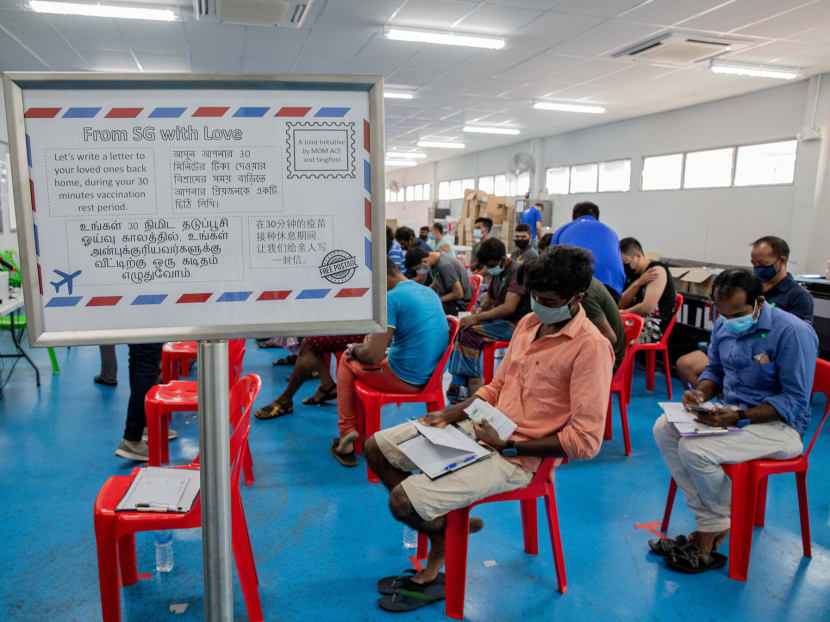For some migrant workers, writing letters home evokes a sense of nostalgia
SINGAPORE — After getting his second dose of the Covid-19 vaccine at CDPL Tuas Dormitory on Sunday (April 11) morning, migrant worker Thonthi Chinnasamy did something that brought tears to his eyes: He wrote a letter to his family in India.

Migrant workers getting their second dose of the Covid-19 vaccine at CDPL Tuas Dormitory taking part in the letter writing initiative, “From SG with Love”, during their 30-minute rest period on April 11, 2021.
- MOM and SingPost are providing letter-writing kits to 10,000 migrant workers getting their vaccinations
- SingPost will sponsor their postage
- Workers said that writing letters brought back memories of a time before mobile phones were popular
SINGAPORE — After getting his second dose of the Covid-19 vaccine at CDPL Tuas Dormitory on Sunday (April 11) morning, migrant worker Thonthi Chinnasamy did something that brought tears to his eyes: He wrote a letter to his family in India.
It has been about four years since the 50-year-old scaffolding supervisor last did this, having become accustomed to calling his family on the phone every day.
However, writing “dear mother and father” on paper again brought back memories of how he used to write to his family back home when he first came to Singapore.
“In the first few years when we (workers) came to Singapore, it was difficult to adjust and we used to write letters home. At that time, there was no WhatsApp or mobile phones,” recalled Mr Chinnasamy, who has been working on and off in Singapore since 2000.
The postage for his latest letter will be sponsored by national postal service SingPost, in an initiative with the Ministry of Manpower (MOM) to allow 10,000 migrant workers to write home.
Dubbed “From SG with Love”, the initiative gives vaccinated workers an opportunity to pen letters to their loved ones during the 30-minute break — or observation period — after their injections.
Letter-writing kits, consisting of paper, pen and an envelope, have been provided to workers who are taking their vaccinations in Sungei Tengah Lodge, Tuas View Dormitory, CDPL Tuas Dormitory, PPT Lodge 1B and Kranji Lodge 1 since April 2.
Mr M Balakrishnan, a manager in MOM’s Assurance, Care and Engagement group which supports migrant workers and dormitory operations, said that he and his colleague had pitched the initiative after being inspired by similar efforts by non-governmental organisations to engage migrant workers.
“No doubt the workers have social media like WhatsApp or can call home every day, but nothing beats penning down your feelings in a letter,” said Mr Balakrishnan, aged 58.
Mr Chinnasamy said that he had written to his parents and wife to assure them that he was doing well and to ask them to keep safe back home.
Mr Islam Md Minhajul, who also received his second dose of the vaccine at CDPL Tuas Dormitory on Sunday, wrote to his family to let them know that he had just received his second Covid-19 jab and that he was keeping well.
While he calls home frequently, there are some feelings that are better articulated in a letter rather than through the phone, the 26-year-old scaffolder said.
For Mr Vinoj George, an Indian national, it was his first time writing a letter home in his 12 years in Singapore.
“I just wrote a letter to my wife telling her to take care of our family and keep our children safe,” said the 37-year-old machine operator.
Having last visited his family in 2019, he added that he is missing his children, aged five and one-and-a-half years old, and is looking forward to seeing them soon.
Mr Robin Goh, the group chief brand and communications officer at SingPost, declined to reveal the budget for the initiative but said that the firm will consider keeping the initiative going after assessing the take-up rate of the current trial.
He added that future iterations of the initiative may also allow workers to take photos with their friends to send home.











